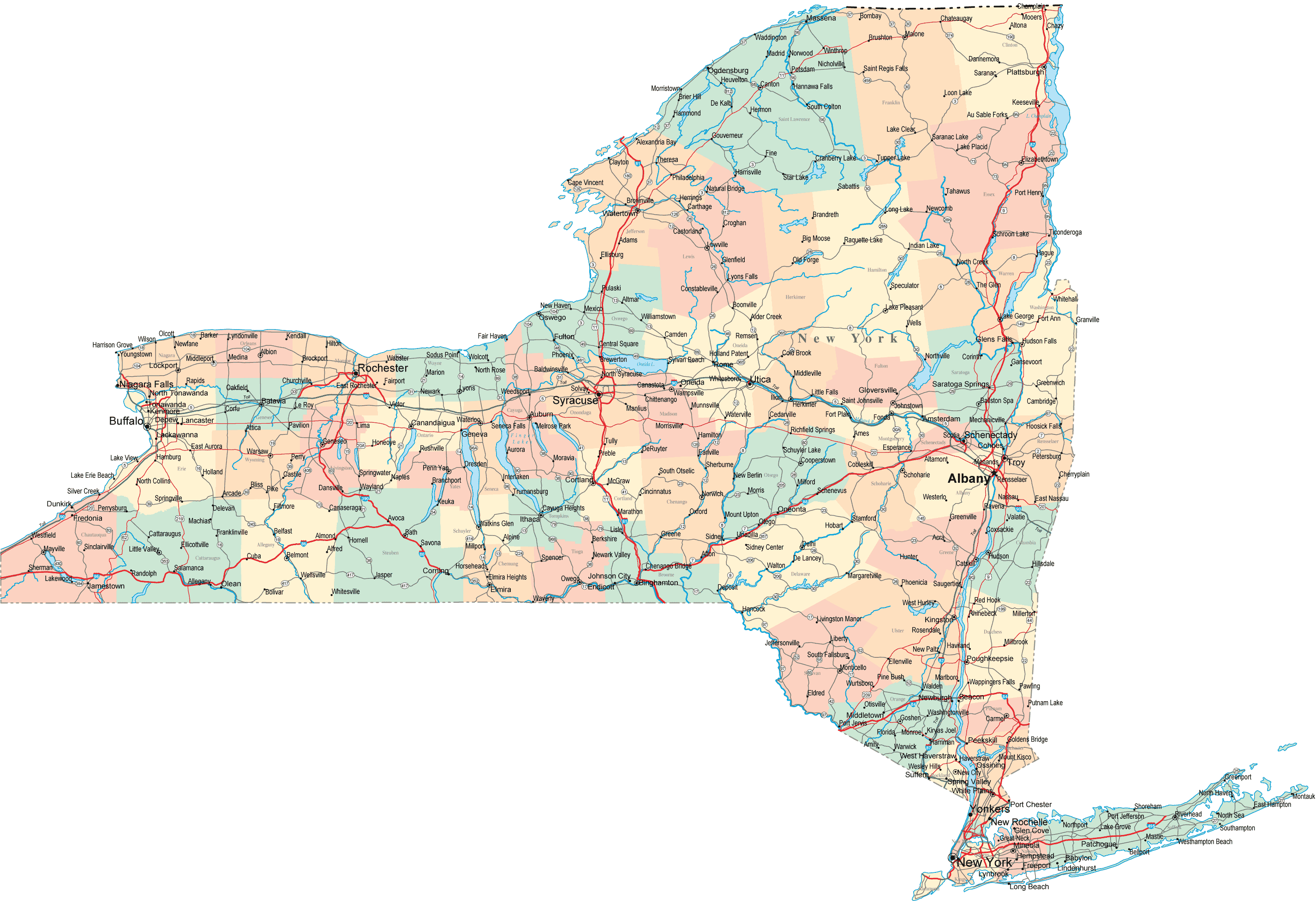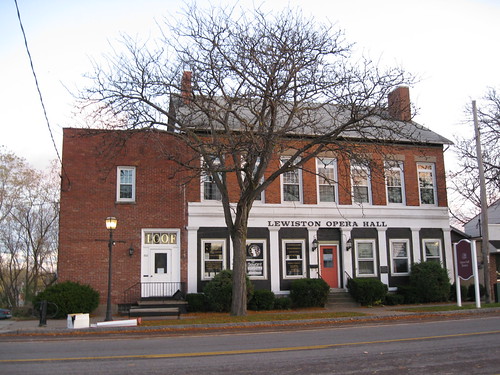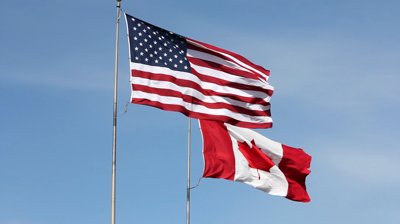Blue Highways: Lewiston, New York
Unfolding the Map
 As we cross over into New York with William Least Heat-Moon (LHM), Lewiston is his first stop in the state. We are also returning to one of the original thirteen colonies for the first time since we left Georgia many posts ago. It's hard to imagine a time when western New York was a frontier, and I'll reflect a little on what that meant and how it played out in literature, especially James Fenimore Cooper's The Last of the Mohicans. If you are lost in New York, get your bearings on the map.
As we cross over into New York with William Least Heat-Moon (LHM), Lewiston is his first stop in the state. We are also returning to one of the original thirteen colonies for the first time since we left Georgia many posts ago. It's hard to imagine a time when western New York was a frontier, and I'll reflect a little on what that meant and how it played out in literature, especially James Fenimore Cooper's The Last of the Mohicans. If you are lost in New York, get your bearings on the map.
Book Quote
"I was in New York: land of Texas hots, beef-on-a-wick, and Jenny Cream ale, where hamburgers are hamburgs and frankfurters frankfurts. I was also within minutes of running out of gasoline. I took a guess that Lewiston would be a left turn; if not, I was in trouble again. But it was there, looking a century older than the Michigan towns I'd come from.
In fact, Lewiston was two centuries older, although the oldest buildings now standing were ones built just after the British burned the town in 1813. I filled up next to an old stone hotel where, the gas man told me, James Fenimore Cooper wrote The Spy. 'It's some book, they say. Understand,' he added, 'our station wasn't here then.'"
Blue Highways: Part 8, Chapter 1
 Lewiston Opera House. Photo by "Dougtone" and hosted at Flickr. Click on photo to go to host page.Lewiston, New York
Lewiston Opera House. Photo by "Dougtone" and hosted at Flickr. Click on photo to go to host page.Lewiston, New York
I've only read one book by James Fenimore Cooper - The Last of the Mohicans. It's amazing how, once LHM (and us, as we read) travel over three-hundred miles of territory, we get into an area of the country that is significantly older than the rest of the United States. While the Midwest, being a territory and relatively free of European settlement except for trappers and explorers, the state of New York was one of the original thirteen and had been fought over between British and French, British and Americans, and Americans and Natives already.
The book of Cooper's, which he wrote in Lewiston, to which LHM refers in his quote has been unknown to me. The Spy is set during the Revolutionary War, a time period I have already admitted in a previous post that I know little about beyond what was taught to me in primary school. The Last of the Mohicans is set in an even more dim historical setting for me, the pre-Revolutionary time of the French and Indian Wars when Britain fought an alliance between France and Natives for control of Canada and the northern colonies. Cooper's writings fit into the Romantic genre, and The Last of the Mohicans creates a juxtaposition between the might of the armies of Britain and France and the fading and disappearing cultures of the Natives of upper New York. If you read The Last of the Mohicans, after getting used to the writing you'll find beautiful descriptions of New York as the untamed wilderness it once was. Of course, this fits into Cooper's Romantic view - the Mohicans are the untamed, noble savages and his main character hero, Natty Bumppo, also known as Hawkeye for his tremendous aim with a flintlock rifle, is a man who is prefers the company of his Mohican companions rather than the French and British settlers and soldiery with whom he has more genetically and culturally in common. The Indians themselves are being corrupted by contact with the Europeans, dramatically in the person of Magua who, as chief of the Huron tribe has thrown his lot in with the French. There are also descriptions of the various Native tribes of the area who either side with the French or the British or try to remain neutral. At the end of the novel, Cooper's Romanticism is completely front and center with a Native Mohican, Uncas, accompanied by his love Cora, killed in battle and then buried together leaving Uncas' father Chingachgook the last Mohican. A Native wise man then proclaims:
"The pale-faces are masters of the earth, and the time of the red-men has not yet come again...."
It's hard to envision New York state as it once was. It's greatest city, then commanding only the southern part of Manhattan Island, now covers that entire island, Staten Island and the boroughs to its east. The mighty forests and fearsome wilderness of the area, once full of Natives as well as beasts, ghosts, mysteries and terrors that fueled a generation of early American writers, have been brought to their knees under the axes and industry of the European settlers and have yielded to farmlands growing fruits, vegetables and grains. In the New York state of 250-300 years ago, the frontier once began right outside the edge of the town or village, and sometimes right outside the front door. In modern New York state, the frontier is something read about in books, seen on television or in movies, or defined as a different type of frontier - a non-tangible thing whose terrors, treasures and opportunities are more of a financial, business or electronic nature.
We occasionally catch wisps of the old frontier. Jack Kerouac, in the guise of his avatar Sal Paradise at the Bear Mountain Bridge in On the Road, comes face to face with the loneliness and the fear of the remnants of the old frontier and quails, turning his back on his dream to hitchhike along Route 6. He instead flees back to New York and catches a bus that takes him all the way to Illinois before he attempts hitchhiking again. One can probably find echoes of the old frontier in the Adirondacks and perhaps get far enough away from civilization that a small twist of imagination will bring Hawkeye, Chingachgook and Uncas striding around the corner, rifles at the ready.
Yes, as we move into the original thirteen colonies one can find history. One can also find titanic struggle as settlers fight against the elements, the Natives, other Europeans and their own fears and shortcomings. When you step foot into New York, you can see this history and even feel the difference of this colonial and revolutionary past and, let's say, the Midwest, Old West, South and other areas that would eventually become the United States. It's a history that, except for some limited exposure, I am not familiar with and therefore, when I read about it or have experienced it in my own travels through the region, it impresses itself upon me in a powerful way.
Musical Interlude
I'm putting up some music from the 1992 movie version of The Last of the Mohicans. I guess that because they got a younger Daniel Day-Lewis to play Hawkeye, he had to have a love interest (Cora), so they switched things around a bit from the book. While Uncas still dies at the end, in the movie Cora lives. Instead in the movie, the younger blonde sister dies for love of Uncas. In the book, the younger sister lives and marries the gallant American officer. So, if you watch the movie, you should know that it is not completely the story that Cooper told in his novel.
That being written, it is good music and the theme was composed by Dougie MacLean.
If you want to know more about Lewiston
Historic Lewiston
Lewiston Art Festival
Lewiston Jazz Festival
Niagara County Peach Festival
Niagara River Region Chamber of Commerce
Wikipedia: Lewiston
Next up: Cheshire, New York




 Wednesday, May 9, 2012 at 10:46AM
Wednesday, May 9, 2012 at 10:46AM





